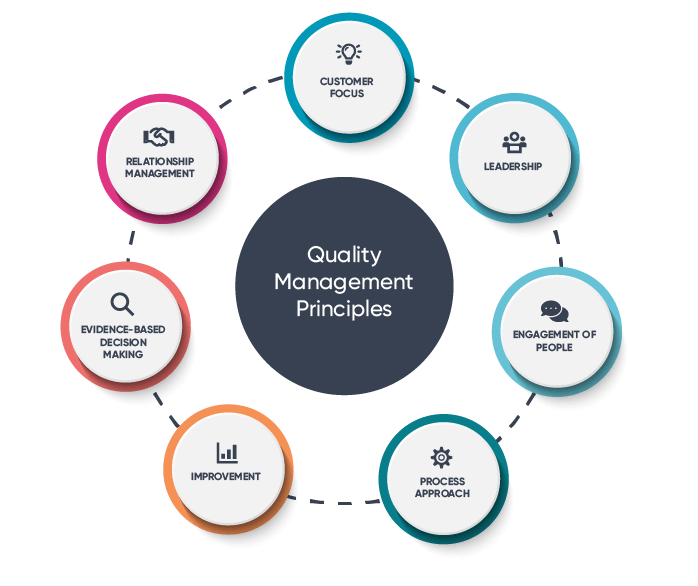
The ISO 9001:2015 standard for quality management systems is built upon a foundation of seven key principles. These principles, although reduced from eight in the previous edition, serve as the guiding philosophies for organizations striving for excellence. In this article, we will delve into these principles and explore their significance, using relatable quotes to enhance our understanding.
Principle 1: Customer Focus – “The Customer is the Boss!”
“There is only one boss. The customer. And he can fire everybody in the company from the chairman on down, simply by spending his money somewhere else.” – Sam Walton (founder of Wal-Mart)
Satisfying the customer and cultivating loyalty are paramount in today’s world, where social media empowers customers to voice their feedback instantly. Building an excellent reputation or facing a tarnished image rests on meeting customer expectations. Organizations must identify and anticipate these expectations to ensure that their products and services align with what their customers desire.
Principle 2: Leadership – Empowering Others to Achieve
“Leadership is the art of getting someone else to do something you want done because he wants to do it.” – Dwight Eisenhower
Effective management involves defining organizational objectives, ensuring the availability of resources, and involving staff in decision-making processes. By doing so, organizations establish a clear direction and create an environment where every individual feels motivated to contribute. It is through this collaborative effort that success is achieved.
Principle 3: Engagement and Valuing the Staff – Unleashing the Power Within
“Tell me and I forget. Teach me and I remember. Involve me and I learn.” – Benjamin Franklin
The notion of staff engagement goes beyond just being “engaged” with their work. Employees should also be valued and respected as individuals. Recognizing their contributions, nurturing their skills, and providing opportunities for personal growth elevates not only the staff but also the entire organization. It’s about building a workforce that is both passionate and qualified.
Principle 4: Process Approach – Orchestrating Systematic Success
“A civilization that proves unable to solve the problems that its functioning creates is a decadent civilization.” – Aimé Césaire
The process approach involves viewing an organization as a network of interconnected sub-activities. Each process takes inputs and produces outputs, creating a seamless flow of data and activities. By adopting this approach, organizations can effectively manage their activities, address their various needs, and work towards fulfilling their objectives. Dividing the organization into departments or services that manage specific processes enhances efficiency and effectiveness.
Principle 5: Continuous Improvement – Embracing Progress
“Life is like riding a bicycle. To keep your balance, you must keep moving.” – Albert Einstein
Organizations must continuously seek improvement to maintain and enhance their performance levels. By striving for continuous improvement, organizations can improve customer satisfaction, enhance process performance, reduce risks, seize opportunities, and correct non-conformities. It is a mindset that encourages growth and progress, ensuring that organizations remain dynamic in an ever-changing world.
Principle 6: Evidence-Based Decision Making – Decoding the Truth
“What can be asserted without evidence can be denied without evidence.” – Euclid
To make informed decisions, organizations must rely on objective data rather than subjective opinions. By analyzing causes and effects, organizations can reduce uncertainty and make sound decisions. This approach, rooted in evidence, allows organizations to understand the impact of their decisions and enable data-driven improvements.
Principle 7: Relationship Management – Nurturing Connections
“Relationships are the mirror in which we discover ourselves.” – Jiddu Krishnamurti
Stakeholders play a significant role in an organization’s success. This includes suppliers, banks, regulators, and even ISO 9001 itself. To enhance performance, organizations need to communicate and collaborate with their stakeholders, considering their requirements and feedback. By fostering strong relationships, organizations can leverage the collective wisdom of their stakeholders to drive improvement and achieve excellence.
The principles outlined here serve as a foundation for organizations aiming to embrace quality management. By aligning their practices with these principles, organizations can cultivate a customer-centric culture, empower their staff, streamline processes, foster continuous improvement, and forge strong relationships with their stakeholders. Embracing these principles allows organizations to unlock their true potential and thrive in today’s dynamic business landscape.
For more insights on management and quality principles, visit Management.
